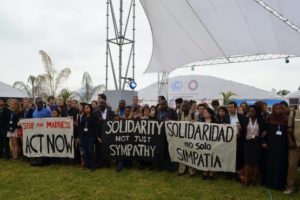IBON International Update #16 – WTO
BALI, 7 December 2013 – The Ninth Ministerial Conference of the World Trade Organization concluded a new trade deal after intensive consultations almost round the clock from Wednesday 4 December until the early hours of Friday 6 December, followed by overnight meetings of heads of all delegations the following night.
The Bali trade deal is the first multilateral agreement reached in almost 20 years of WTO history. World leaders are now celebrating the Bali agreement for restoring confidence in the WTO after over a decade of failed ministerials.
WTO director-general Roberto Azevedo shed tears during the summit's closing ceremony on Saturday, a day after its scheduled conclusion. “We did it!” said Indonesia’s Trade Minister Gita Wirjawan, who chaired the conference.
European Union President Jose Manuel Barroso said "I'm delighted at the news this morning of the global trade deal in Bali. This will give a real boost to the global economy."
“The WTO has entered a new era,” remarked U.S. Trade Representative Michael Froman. He said that the trade facilitation part of the agreement will be a major boost to U.S. small exporters trying to navigate complex customs rules abroad.
Azevedo affirms this, saying "We're back in business … Bali is just the beginning."
Many believed the Ministerial was headed for another collapse especially after India declared that its food security was non-negotiable. It made vociferous objections to provisions that might endanger grain subsidies program mandated by its new food security bill. In the end India agreed to an interim Peace Clause that it says would protect existing food stockholding programs of developing countries from legal challenge under the WTO’s agreement on agriculture until a more permanent solution is agreed.
At the 11th hour, Cuba objected to removal of a reference to the decades-long US trade embargo that the small Caribbean island-nation wants lifted. Together with Bolivia, Nicaragua, and Venezuela, Cuba also expressed serious reservations about serious imbalances in the Bali package in favor of richer countries. After negotiations that lasted until the wee hours of the morning of December 6, a compromise was struck in the form of a sentence upholding the principle of non-discrimination in goods in transit added to the final declaration.
On the other hand, civil society groups have been mostly critical of the Bali Deal.
The Our World Is Not For Sale (OWINFS) network says the Peace Clause agreed only applies to existing Food Security programs, leaving out poor countries that might be in the process of developing such programs.
The APWLD says that “while we endorse the principle that governments should have the autonomous power to manage their own food security policies, without threats and bullying from other countries, we don’t think this should be gained in a trade deal that opens up markets through increased ‘trade facilitation’.”
The OWINFS network says the deal on Trade Facilitation was shamelessly over-hyped in the media in terms of claimed economic gains and that it represents more of the same failed model of pro-corporate globalization and liberalization. “The bad deal binds developing countries to the customs and port-of-entry policies and procedures that rich countries have implemented over many decades to their own advantage, imposing excessive regulatory, human resources, and technological burdens on developing countries.”
OWINFS says “The package of policies for the LDCs, which members agreed to almost a decade ago but have failed to implement, is completely non-binding. It is shameful that it was held hostage to rich country demands for pro-corporate rules on Trade Facilitation. This state of unfairness further exposes the WTO as an institution that facilitates the corporate priorities of developed countries over the needs of the poorest members.”
“After 12 years of impassè, the WTO makes a midnight deal as a last-ditch effort to renew its legitimacy. But this Bali deal is an omen of a more aggressive neoliberal offensive,” says Ario Adityo, national coordinator of the Indonesian Peoples Alliance (IPA). The Bali agreement, according to Adityo, sets the stage for a new expansion of the neoliberal agenda that is geared towards further liberalization of trade and agriculture, and privatization of services and technology.
A statement signed by over 30 civil society organizations including IBON International underscored the need to abandon the World Trade Organization and work towards an “Alternative Framework for International Trade and Cooperation for Development Justice.” The statement released 3 December says “instead of acceding to the unfair trade and investment regime that is being codified, strengthened and enforced by the WTO, free trade agreements such as the transpacific partnership and other neoliberal economic agreements, we need to abandon neoliberal globalization as a framework for development and international relations.”
The statement calls for a “Social Summit on Trade and Development” where social movements, civil society, academics, parliamentarians, local authorities, policy makers and officials from governments and multilateral institutions can gather to discuss and elaborate an alternative multilateral agenda for trade and development based on the basic principles of solidarity, equality, cooperation and respect for human rights. ###



